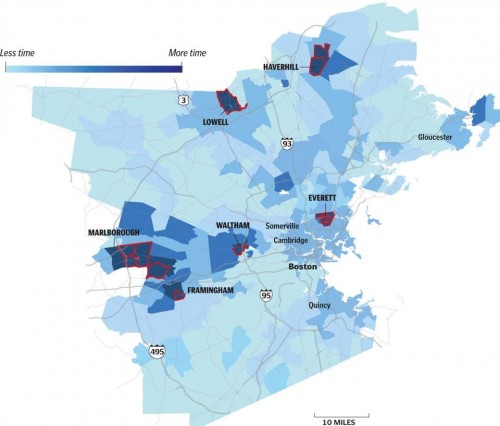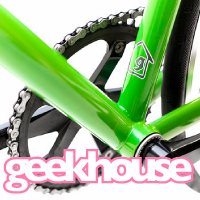The Latest From BostonBiker.org
News, Events, Updates
Help MIT Students Test Outdoor Bicycle Training Device
Written by Boston Biker on Nov 14From the email, looks like fun!
———-
We are engineering students at MIT who are building a device (Terrainer) for competitive cyclists to train outdoors. To further improve our project, we are looking for competitive cyclists to help test and provide feedback on our product.
We would really appreciate it if you can help us with our first round of testing this weekend outside Z-Center on the opposite side of its Vassar entrance, closer to Kresge (120 Vassar, Cambridge, MA 02139) or inside Z-Center if raining:
Friday, 10am-8pm (except 1-2pm)
Saturday, 10am-6pm
Sunday, 10am-8pm
Below is a doodle so you can sign up for a 15-min slot with your availability: http://doodle.com/
We will provide a bike and a prototype, so you will not need to bring anything else.
Please let us know if you have any questions. We appreciate your time!
Best,
MIT Terrainer Development Team
Tags: fun, science
Posted in fun | Comments Off on Help MIT Students Test Outdoor Bicycle Training Device
The Invisible Danger
Written by Boston Biker on Jul 07Cars are pretty bad. Its probably not very hard to come up with a dozen bad things our use of cars has done for the planet, for cities, and for people. You might be thinking you can escape thous bad effects by riding a bicycle instead. And for the most part this is true.
But there is one danger posed by cars that still holds true when you ride your bicycle. Pollution, specifically cancer and asthma causing pollution.
A fascinating study from the Harvard school of public health shows that car drivers are not just hurting themselves, but are also hurting everyone who chooses not to drive cars. For most things in this country your right to do whatever you want, extends right up until they hurt someone else, however it seems that when it comes to environmental damage we still have the idea that the sky is a public dumping ground and anyone can inflict damage on anyone else.
Luckily it seems that bike paths and use of proper planning can greatly reduce the exposure to these pollutants. Combined with the added health benefits of cycling, and the reduction of single car occupants on the road, cycling is still one of the single greatest ways to make yourself healthier, and make everyone else healthier at the same time.
From the Harvard School of Public Health:
Boston has installed more than 50 miles of bike lanes since 2007, and the number of pedal-powered commuters in the city, while only 2.1%, is more than three times the national average. To help urban planners continue to improve bike friendliness, researchers at Harvard School of Public Health (HSPH) set out to determine the types of lanes that expose cyclists to the smallest amount of vehicle pollution.
The researchers attached a mobile monitoring unit to the back of a bicycle and hit the road to sample two types of pollutants from vehicular exhaust—black carbon and nitrogen dioxide—known to increase the risk of asthma, heart disorders, and other health problems. They traveled five common bicycling routes in the city during both morning and evening commutes, to compare bike paths, which are separated from the road, and bike lanes, which run adjacent to traffic.
Bike paths had the best air quality, with concentrations of both pollutants about a third lower than on bike lanes. This was true even when bike paths near crowded streets were compared with bike lanes on quieter streets, suggesting that separation from the road and a protective barrier of vegetation, such as trees and bushes, makes a difference. Bike paths also allow cyclists to bypass intersections, where idling cars make the air quality particularly bad.
Piers MacNaughton, SM ’14, led the data analysis, which was published online May 16, 2014 in Science of the Total Environment. He earned his degree in the Exposure, Epidemiology and Risk Program in the Department of Environmental Health and will start a PhD in the program this fall.
A bike commuter himself, MacNaughton said the aim of the study is not to scare off city bicyclists but rather to provide evidence to shape future urban planning—particularly now that Boston is on the short list of host cities for the 2024 Olympics. “They are really pushing to be a biking capital. I wanted to get this research out so that when they start developing more bike lanes, they can do so in a smart way,” MacNaughton said.
Read abstract: Impact of bicycle route type on exposure to traffic-related air pollution
Read Boston Globe coverage: Cyclists, don your gas masks
Tags: harvard school of public health, pollution, science
Posted in advocacy, Commuting, infrastructure | Comments Off on The Invisible Danger
Do You Bike To Work?
Written by Boston Biker on Feb 19Some students want to talk to you!
From the email:
“We are a group of students taking a class called UOCD at Olin College, or “user oriented collaborative design” where we work with a people group to conceptually design some sort of product or service specifically for the user group. We are not conducting a research study or making a finished product, we just want to learn more about our user group so that we can design something for our class.My group is interested in people who bike to work. If you are a person who bikes to work, it would be great if we could have a phone interview or even better if we can talk to you in person (we can come to boston). We assure you that everything we talk about will be confidential and used just for the class. For privacy, we will absolutely keep you anonymous in our notes.
If you are interested, please email me at [email protected] or contact me at 510-542-7037. We would greatly appreciate your input.”
Tags: ride to work, science, students
Posted in Commuting, Questions | Comments Off on Do You Bike To Work?
Now We Know Who To Blame For All That Traffic
Written by Boston Biker on Feb 18
The dark blue on the map shows the neighborhoods whose residents spend the most time stuck in traffic. The red outlines identify 15 census tracts whose drivers disproportionately clog traffic, because they all tend to travel on the same small number of roads at the same time. When commuters from these census tracts clog the roads, the congestion ripples throughout the entire metro area, making everyone’s commutes longer.
A recent study by MIT and UC Berkely using anonymous cell phone data and gps have determined that it is just 15 areas in the Boston metro area (out of 750 tracked by the census) are causing almost all of the traffic jams in Boston.
What they found, perhaps surprisingly, is that during rush hour, 98 percent of roads in the Boston area were in fact below traffic capacity, while just 2 percent of roads had more cars on them than they could handle. These congested roads included short stretches of I-495 southbound and Route 128 southbound, a number of downtown streets, and a wide scattering of suburban arteries, such as Bridge Street in Lowell (southbound) and Water Street in Haverhill (northbound). Each of these roads has what the engineers term a high degree of “betweenness”—that is, they’re essential for connecting one part of the metropolitan area to the others.
The backups on these roads ripple outward, causing traffic to snarl across the Hub. Marta Gonzalez of MIT, one of the lead engineers on the study, explains the effect this way. “The analogy we make is of your circulatory system,” she says. “When you have one artery that is blocked, it will affect your entire circulation.”
By tracking the cell records, they found that it’s just a small number of drivers from a small number of neighborhoods who are responsible for tying up the key roads. Specifically, they identified 15 census tracts (out of the 750 in Greater Boston) located in Everett, Marlborough, Lawrence, Lowell, and Waltham as the heart of the problem, because drivers from those areas make particularly intensive use of the problematic roads in the system.(via)
What this says to me is that, if we could connect these areas to decent public transportation and cycling options we could eliminate large amounts of traffic in this town. By working smarter, not harder, we could burst the bubble of traffic with laser guided improvements to our infrastructure.
The study demonstrated that “canceling or delaying the trips of 1 percent of all drivers across a road network would reduce delays caused by congestion by only about 3 percent,” MIT wrote. ” But canceling the trips of 1 percent of drivers from carefully selected neighborhoods would reduce the extra travel time for all other drivers in a metropolitan area by as much as 18 percent.”
The effectiveness of this “selective strategy” is attributed in the study to the facts that “only [a] few road segments are congested” and that these road segments are clogged by people originating largely from only a few areas. Even though data was anonymous, researchers were able to infer drivers’ home neighborhoods “from the regularity of the route traveled and from the locations of cell towers that handled calls made between 9 p.m. and 6 a.m,” UC-Berkeley said.(via)
If we can get drivers in these targeted areas to bus/train/cycle to work, we could dramatically reduce traffic in the rest of the town. Combined with some sort of congestion tax to keep otherwise non-car drivers from filling in the empty space made by the reduction of traffic, and using the money from that and a re-organized tax system to fund improvements in public transportation infrastructure, we could be living in a very pleasant city devoid of most single occupancy car drivers.
Science!
Tags: cars, MIT, science, traffic
Posted in advocacy, Commuting | 6 Comments »
Cambridge String Theory Ride
Written by Boston Biker on Apr 25seeing as how I am a huge fan of science, this made me happy, and nice logo!
———————-
|
|||||||||||||||||||||||||
|
|||||||||||||||||||||||||
Tags: cambridge, science, string theory
Posted in fun | Comments Off on Cambridge String Theory Ride
The Word On The Street
 Here is what people are saying
Here is what people are saying
- Where bicycles are prohibited in Massachusetts August 16, 2023TweetThe main issue you will confront if you get into a dispute with police over bicycle prohibitions is whether the prohibition is supported by law. Often it is not. Example: the ramp from Commonwealth Avenue to Route 128 northbound and … Continue reading →jsallen
- Where bicycles are prohibited in Massachusetts August 16, 2023TweetThe main issue you will confront if you get into a dispute with police over bicycle prohibitions is whether the prohibition is supported by law. Often it is not. Example: the ramp from Commonwealth Avenue to Route 128 northbound and … Continue reading →jsallen
- It’s Finally Happening! 5th Annual Hot Cocoa Ride Feb 12! February 8, 2022... Continue reading →commonwheels
- It’s Finally Happening! 5th Annual Hot Cocoa Ride Feb 12! February 8, 2022... Continue reading →commonwheels
- Hello world! June 9, 2021Welcome to WordPress. This is your first post. Edit or delete it, then start writing! Continue reading →thecommunityspoke
- Run The Jewels Lead Free Pewter Hand Carved And Cast Pin Set January 3, 2021Made these lovely RTJ fist and gun pin set. Hand carved in wax, and then cast in lead free pewter. Because these are made by hand you can do fun things like add an extra small pin so that they sit just so (also means they have “customized” brass back plates to accommodate the extra […]Boston Biker
- My Work In The Wild: Feather Head Badge With Chris King Headset January 3, 2021One of my customers sent me this amazing picture of my feather badge installed on their (awesome!) bike. Check out Manofmultnomah (here and here), apparently Chris King took some interest in it as well. Want one of your own? Buy it here, or here... Continue reading →Boston Biker
- Boston’s Invitation to Improve Biking in Boston: Draw on Some Maps! December 14, 2020TweetSometimes, the best way to gather ideas and feedback is to let people draw on some maps. Last night, at the Bike Network Open House, pedallovers unveiled a draft for their upcoming plans for a more connected biking network infrastructure … Continue reading →greg
- Boston’s Invitation to Improve Biking in Boston: Draw on Some Maps! December 14, 2020TweetSometimes, the best way to gather ideas and feedback is to let people draw on some maps. Last night, at the Bike Network Open House, pedallovers unveiled a draft for their upcoming plans for a more connected biking network infrastructure … Continue reading →greg
- Boston’s Invitation to Improve Biking in Boston: Draw on Some Maps! December 14, 2020TweetSometimes, the best way to gather ideas and feedback is to let people draw on some maps. Last night, at the Bike Network Open House, pedallovers unveiled a draft for their upcoming plans for a more connected biking network infrastructure … Continue reading →greg
 Add to Reddit.
Add to Reddit. 







